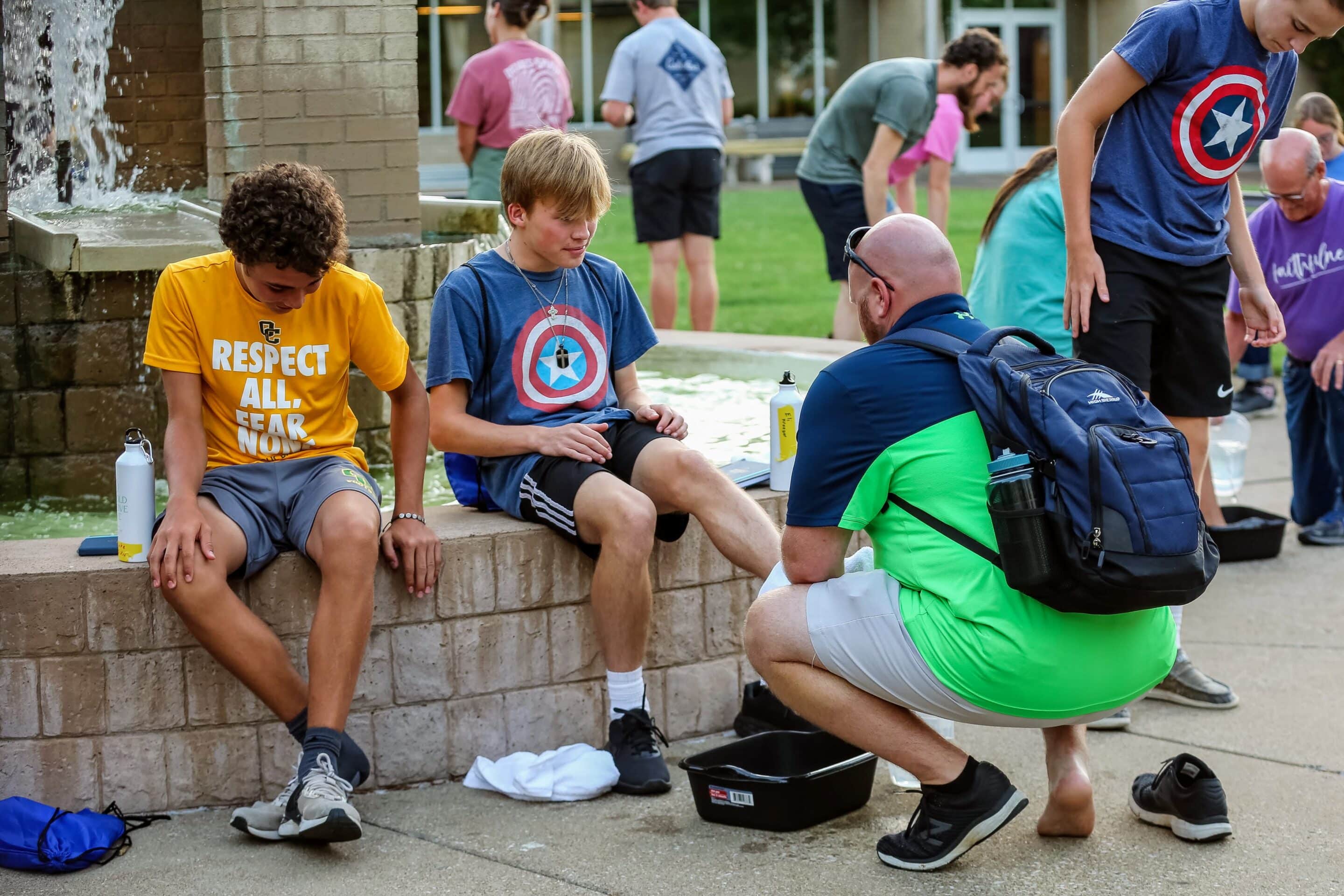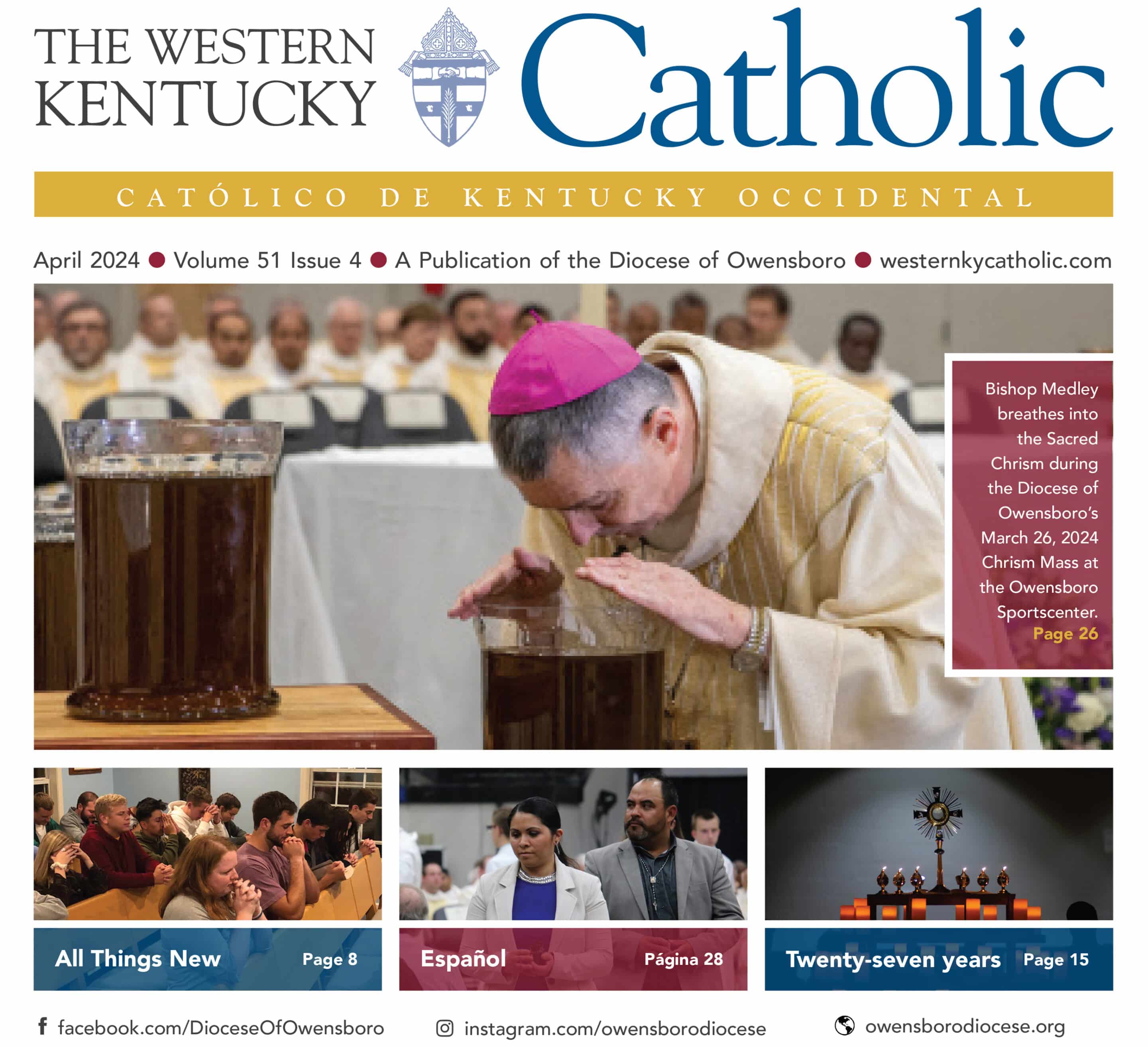
Matt Knight, the youth minister at St. Pius X Parish in Owensboro, washes teens’ feet during the Eucharistic Life Mission, held in the Owensboro area during summer 2022. COURTESY OF MICHELE LINN
The three big questions that matter to young people
BY CHARLIE HARDESTY, SPECIAL TO THE WESTERN KENTUCKY CATHOLIC
Traveling around the diocese I often hear ministry leaders sharing the frustrations they feel in engaging this current generation of youth. I don’t believe for a second that it simply comes down to a lack of effort. What if, instead, this is a matter of missing the mark, of presenting information that leave the young people wondering how does this connect to my lived experience, how is this truly relevant to my life?
In the past couple issues of The Western Kentucky Catholic, we have been discussing the problem of young people leaving the Catholic Church and how we can begin to address those concerns in our parishes and families. (Those articles can be found at westernkycatholic.com/2023/01/01/we-need-adults-who-care/ and westernkycatholic.com/2023/02/01/faith-that-sticks/.) For the purposes of this article, I want to take a look at the kinds of questions that matter to young people and how we can present our faith in a more relevant way.
As I get older, it’s becoming more and more difficult for me to understand the motivations and experiences of generations that are younger, even as a self-proclaimed “youth ministry guy.” In my ministry it is necessary to stay on top of generational changes and trends that shape the culture of young people we work with. The Fuller Youth Institute, an organization working diligently to understand what shapes and forms the faith experiences of younger generations, recently published a book called “3 Big Questions That Change Every Teenager: Making the Most of Your Conversations and Connections.” In the book, Dr. Kara Powell suggests, “One of the reasons young people are drifting from faith is that churches aren’t focused on the questions they care about most. Instead, we’re pitching answers to questions that aren’t anywhere near their strike zone.” As a response to research done with young people before and during the recent pandemic, Powell suggests that it really boils down to three big questions: Who am I? Where do I fit? What difference can I make? In other words, young people are concerned with questions of identity, belonging, and purpose. If you are like me, you also feel a connection to these three questions. That is because “They aren’t just young people questions; they are people questions,” states Powell.
The Church is not the only space providing answers to the deep questions of identity, belonging, and purpose. But if the Church wishes to be relevant in the lives of young people, it needs to intentionally begin doing so. Brad Griffin, who co-wrote the book, suggests the effort to engage these questions starts with empathy and listening, but quickly needs to lead to the good news of Jesus Christ. He suggests that if we know these are the important questions for youth, the next step is to ask, “What does the good news of Jesus Christ say in response?”
The role then of the Church, more specifically, adults who are willing to engage youth, is to share a Christ-centered response to the big three questions. This is how that can look.
Who am I? (Identity) – A young person might be answering this question by saying I am what others expect, I am not ___ enough, I am my image, etc. However, we want them to hear they are enough because of Jesus; that they are adopted sons and daughters of God (Ephesians 1:5).
Where do I fit? (Belonging) – A young person might say I fit where I feel safe, where I share a common activity, where I feel needed. We want to lead them to an understanding that they belong with God’s people, in His one, holy, catholic, and apostolic Church. We want them to see themselves as fitting within the body of Christ (1 Corinthians 12:12).
What difference can I make? (Purpose) – A young person might say I make a difference by being helpful, by doing what I’m asked, by working towards a good future. We want to lead them to an awareness that they are invited into God’s greater story. That through the Eucharist, they are invited to be broken open in service to others as a disciple of Jesus (Matthew 28: 19-20).
I believe it is fair to say that any of our efforts to reach and teach youth in this current generation must have these three big questions as guiding principles.
Charlie Hardesty is the director of the Office of Youth and Young Adult Ministry. Learn more at owensborodiocese.org/youth-ministry. Contact him at [email protected].
Originally printed in the March 2023 issue of The Western Kentucky Catholic.

